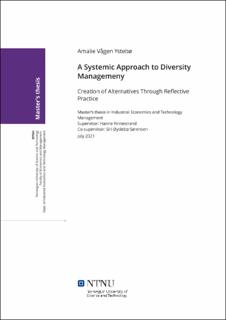| dc.contributor.advisor | Finnestrand, Hanne | |
| dc.contributor.advisor | Øyslebø, Siri Sørensen | |
| dc.contributor.author | Ystebø, Amalie Vågen | |
| dc.date.accessioned | 2021-10-05T17:21:26Z | |
| dc.date.available | 2021-10-05T17:21:26Z | |
| dc.date.issued | 2021 | |
| dc.identifier | no.ntnu:inspera:85378491:85474067 | |
| dc.identifier.uri | https://hdl.handle.net/11250/2787870 | |
| dc.description.abstract | Formålet med denne oppgaven er å utvikle en metodikk som tar for seg operasjonalisering av empirisk forskning og praksis for mangfoldsledelse som søker å skape endring. Metodikken bygger på prinsipper fra aksjonsforskning.
Mangfoldsledelse har fått økende oppmerksomhet i virksomheter som ønsker å engasjere seg i spørsmål knyttet til likestilling og mangfold. Nye lovkrav i Norge aktualiserer også temaet gjennom aktivitets- og redegjørelsesplikten som trer i kraft fra 2020 som en del av likestillings- og antidiskrimineringsloven. Dette krever at organisasjoner engasjerer seg i hvordan de skal jobbe med likestilling og mangfold.
Denne studien er en casestudie som tar en kvalitativ tilnærming. Semi-strukturerte intervjuer blir gjennomført for å utforske situasjonen i selskapet, og en intervensjonsstrategi er utviklet for å engasjere seg i hvordan man kan jobbe med likestilling og mangfold i praksis. Intervensjonsstrategien er en to-timers workshop som bruker refleksjon som et verktøy for å skape endring. Målet med intervensjonen er å skape dialog om hvordan man kan jobbe med å redusere ulikheter og fremme mangfold og inkludering.
Forskningen finner ut at intervensjonsstrategien lyktes i å sette ulike perspektiver på mangfold og likestilling i dialog med hverandre. Det ble merkbart at mangfold og likestilling knyttes til at organisasjonen blir mer lønnsom og presterer bedre, noe som er en motivasjonsfaktor for selskapet. Men gjennom dialog ble dette perspektivet også satt i dialog med andre perspektiver som prioritert interessene til de som påvirkes av ulikestilling. | |
| dc.description.abstract | The purpose of this thesis is to develop a methodology that relate to the operationalizing of empirical research and practice of diversity management seeking to challenge inequality and enact change. The methodology builds on principles from action research.
Diversity management have received increasing attention in enterprises that wants to engage in reducing inequalities within the organization. New legal requirements in Norway also actualizes the topic through the “activity duty and the duty to issue a statement” taking effect from the year of 2020 as part of the Equality and Anti-Discrimination Act. This calls for organizations to engage in how to work with equality and diversity.
This study is a case study that takes a qualitative approach to engage in intervening into a Norwegian company. Semi-structured interviews are conducted to explore the situation within the company, and an intervention strategy is developed to engage with practice. The intervention strategy is a two-hour workshop that centers reflection as a tool create change. The goal of the intervention is to create dialogue for new actions to be taken, and throughout this dialogue attend to how one can work with reducing inequalities and promote diversity and inclusion.
The research find that the intervention strategy succeeded in putting different perspectives on the diversity and equality in dialogue with each other. It became noticeable that a diversity and equality is perceived as linked to the organization performing better being an interest of the management of the company, which is a motivational factor for the company. However, throughout the dialogue this perspective was also set in dialogue with other perspective prioritizing interests of the once affected by inequality. | |
| dc.language | eng | |
| dc.publisher | NTNU | |
| dc.title | A Systemic Approach to Diversity Management - Creation of Alternatives Through Reflective Practice | |
| dc.type | Master thesis | |
